#life spell pnk
Text




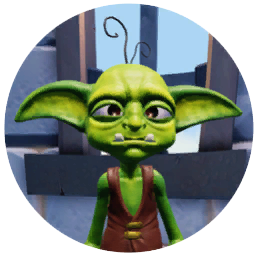



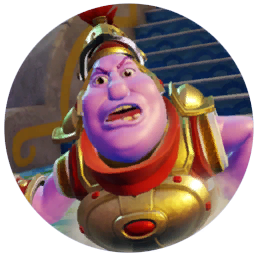
Icons used for Skystones: Overdrive (skylanders superchargers, 2015) (pt5)
#not art#skylanders#skylanders image rip#skylanders superchargers#skystones#hot streak#inflatrators#hammerhead#lift lofter#glumshanks#life spell pnk#hugo#food theif#lord stratosfear#icons
24 notes
·
View notes
Text
Mini-Review and Rant: Monsters University, Anti-femininity, and Some Other Stuff
So, this time I am going to have a little rant. I always think that feminism is important, but I usually try not to hit my readers over the head about it. But not today. Because oh boy, I have a lot to say about Monsters University.

I am not sure why Monsters University particularly irritated me. Probably because it’s Pixar, and I do expect better from them. Pixar is famous for producing high-quality, critically acclaimed children’s animation movies, some of which are my absolute favorites. They are also usually excellent at handling femininity and masculinity, and the majority of their movies are non-gendered (neither a girl’s film or a boy’s film). The second reason is probably because I just finished Pop Culture Detective’s thoughtful video essay about “The Complicity of Geek Masculinity on the Big Bang Theory”, so the topic about masculinity and femininity is fresh in my mind.
Anyway, let’s review Monsters University! (Includes spoilers for Monsters University and Monsters Inc.)
Monsters University (or MU for simplicity in this review/rant) is a prequel to Pixar’s Monsters Inc. (or simply Inc). MU tells the story about how Mike Wazowski and James P. “Sulley” Sullivan met in university, way before they worked for Monsters Inc. In MU, Mike is not a scary monster, but he is determined to be a Scarer and works hard for it. Sulley, on the other hand, is a preternaturally gifted Scarer and serves as Mike’s rival for most part of the film.

MU, on its own, is a good film. It has good set up, a definite arc, and satisfying conclusion. It has characters we care about, and it’s pretty funny too. But it’s when we think beyond the scope of the film that things start to get… shakey. First of all, the story arc of MU is immediately undermined by Inc. MU is about how Mike works to achieve his dream to be a Scarer in the company, but we know in Inc that Mike does not even get to be a Scarer. In Inc, Mike serves as Sulley’s partner, which is basically an assistant. So during MU’s runtime, we already know that all of Mike’s hard work in MU eventually will never pay off and he will forever live in Sulley’s shadow.
Also, Inc’s whole premise is about how Mike and Sulley revolutionize their industry by retiring Scream Energy and switching to Laugh Energy instead, because they met Boo. But instead, all of MU is about glorifying the act of scaring. I know, the events in Inc happens after MU, so Laugh Energy is not a thing yet, but there are ways to incorporate a more cohesive theme throughout the two movies. Probably one of their friends from Oozma Kappa could make an off-hand remark about how they wish there’s another energy source other than children’s scream–just something to foreshadow what will happen in Inc. But there’s no such thing in MU, instead MU is laser-focused at idolizing the scaring industry. Which, again, is fitting when we think about Mike’s arc in just MU, but completely falls apart once we consider the broader theme from Inc.
And that’s all I can say about MU, from the filmmaking standpoint. From here on out, I want to discuss about the representation of social themes in MU. Let the rant begin!

Our protagonist is Mike. Kind, small, with big round eyes, and is underappreciated for his whole life. While the antagonists, the fraternity brothers of Roar Omega Roar or ROR (pictured above)--and also Sulley to a certain degree--are big and muscular, cocky, aggressive, and intimidating. I think it’s safe to assume that ROR is meant to represent the ultimate form of masculinity (they’re fraternity bros, for starters), and, as a consequence Mike and the Oozma Kappas (pictured below) represent a more feminine form of masculinity. You might accuse me of “reading too much into it”, which I think is fair assessment if every other little thing does not reinforce my point.
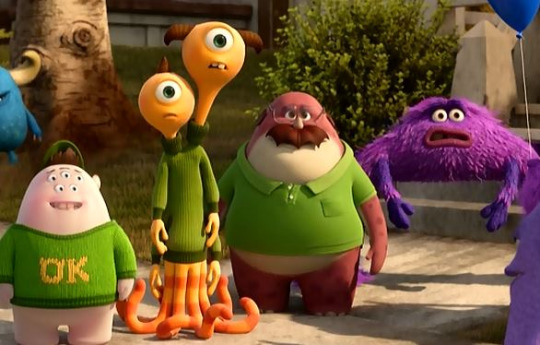
I also know what you’re thinking: Isn’t it a good thing for feminism, that our protagonists (Mike and the Oozma Kappas) are the more feminine of the bunch? Not in MU, because their whole arc is that they really, really want to be like Sulley and ROR. Also, the movie is relentless at making fun of characters for their femininity. In fact, baking and hospitality, which is usually viewed as a part of femininity, was literally spelled out loud as “L-A-M-E” by the movie. When the movie wants to make fun of a character, they used glitter, flowers, stuffed animals, heart signs, and dream journals with unicorn and golden stars.
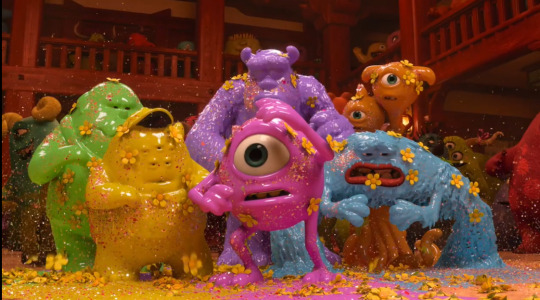
The message of Monsters University is clear: masculinity is coveted, while femininity is viewed as lesser and deserves to be made fun of.
I think it’s no coincidence that there’s no notable female character in MU, aside from Dean Hardscrabble. Hardscrabble is one of the good things in MU–she’s legitimately scary, firm, but kind. Other smaller female roles are Squishy’s mother (who is mostly used as comic relief), and sorority groups HSS (the goth one, pronounced “hiss”, who I don’t even think has any speaking role) and PNK (pronounced “pink”, because they’re girls. GET IT??). PNK consists of six non-descript, identical cheerleader-type girls, because…. GURRLS, am I right?

In a comedy movie, it’s important to ask ourselves, “Who do we laugh at and, and who do we laugh with?” Answer: We laugh at the Oozma Kappas. Always. So eventhough Oozma Kappa eventually wins the Scare Games, the takeaway is that they won despite their more feminine form of masculinity, not because of it.
Which is a shame, because none of that animosity towards femininity exist in Inc. No character in Inc is outright masculine or feminine, except the ultra-feminine and flirty Celia (Mike’s girlfriend) but she’s never shown in a particularly negative light. Sulley in Inc is not even particularly masculine. In fact, his defining characteristics in Inc are his kindness and his paternal relationship with Boo.
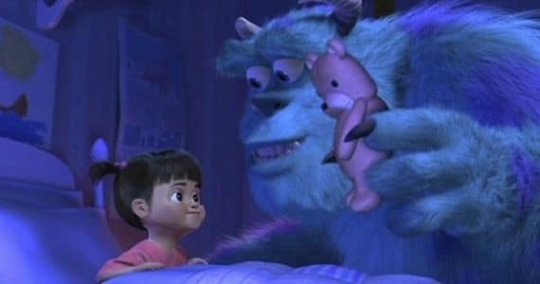
And I want to emphasize that even though I am here to talk about the portrayal of femininity in MU, it is not about the women. It is about the men. With MU as example, it is clear that feminism is not just a woman’s fight–it’s everybody’s fight. Look at how miserable Mike’s life is in MU. Even though he is kind, smart, and works hard, he is belittled because he does not fit the standard definition of masculinity. Mike is only miserable because of the arbitrary societal rule of “how men should be like". So it is clear that misogyny not only affects women, it affects men too. As Emma Watson once wisely said (paraphrased) about feminism, we can only be truly free if women are allowed to be strong and men are allowed to be sensitive. But even in the end of MU, Mike and the Oozma Kappas still end up conforming to the idea of toxic masculinity.
There’s another thing that I want to discuss about MU. I did point out that the entire plot of MU is about glorifying the scaring industry, which is fine in itself because it fits Mike’s arc (a Scarer is not a real career choice anyway). But the movie also goes out of its way to depict other geekier career choices like scream-can architect, or more creative ones like dancer, as–for lack of better word–lame. So MU basically teaches children who watches the movie that a career in STEM and in Arts is neither an important nor fulfilling career choice (Direct quote from the Dean, “Scariness is a true measure of a monster. If you’re not scary, what kind of a monster are you?”). That’s totally not cool, Monsters University, not cool. (I could add a paragraph’s worth of rant about how MU depicted Scarer as an ultimate “masculine” career choice, but I digress. The article is as long as it is.)

So… yeah. This rant/review is all over the place because I have a lot of things to say, but I hope this will give you a new perspective. Pixar, you could do better.
#movie review#film review#movie#film#rant#pixar#disney#monsters inc#monsters university#mike wazowski#sulley#james p sullivan#2017#feminism#masculinity#femininity#oozma kappa#roar omega roar#boo#pop culture detective
3 notes
·
View notes